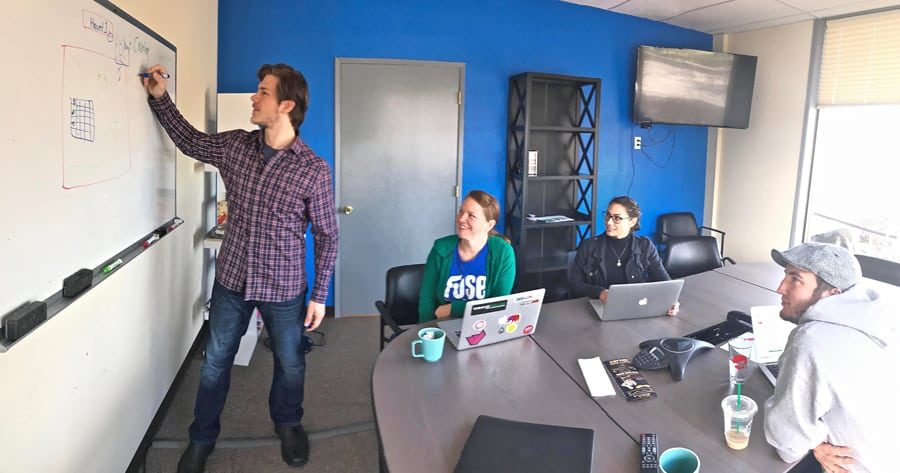
Home » Red Level Games hopes to see green from marijuana video game
Red Level Games hopes to see green from marijuana video game

January 13, 2017
A Richland company recently landed its biggest contract to date that will move a video game idea about the marijuana industry from the whiteboard to the motherboard.
Red Level Games, a video game development company, said the six-figure deal with a private investor will allow it to move a step closer to offering players a fun, safe way to explore the pot industry in the game called Cash Crop.
Players can manage their crops, including deciding whether to grow plants indoors or outdoors, regulate temperature and humidity, and feed and water plants as needed.
As players’ businesses grow, they will have to analyze sales and expenses. They can use virtual profits to buy items such as grow timers to help keep their plants healthy and increase yields.
Grant Williams, the company’s CEO and game designer, said the project will need another half a million dollars to turn the prototype into a playable game.
“(This initial) contract allows us to create a minimum viable product that will give us the gas to get going,” he said.
Red Level Games partnered with Richland software developer Wildland on the pre-alpha design and development work for Cash Crop.
While this is not the first marijuana game available on the market, Williams said there’s currently no commercialized marijuana game like Cash Crop for players interested in the business model genre.
“We want to have a game that’s a pleasant experience and shows the business challenges, and I’m building a game that teaches people to grow, comply with laws, and build a business cycle,” he said, adding he’s also hoping to break through negative stereotypes associated with the marijuana industry. “People go to wineries and they want to see how the wine is made, how it works. You see a lot of marijuana users who care about the product they use, and you don’t see what goes on behind the scenes. We compare that with educating the public and our players so they can understand how (the industry) works.”
Williams said video games in the business genre, such as RollerCoaster Tycoon and Prison Architect—which, in 2015 reportedly earned more than $19 million from more than 1.25 million sales—continue to be popular with players.
“Not everyone wants to blow stuff up or beat people up,” said Williams, whose first game, Dragon, is an action role-playing game. “We’re trying to have a non-violent game. The weed culture doesn’t have a reputation of violence.”
Once the prototype for Cash Crop is complete, Williams will take it to Game Connection, an international event that attracted more than 2,700 developers, publishers, distributors and service providers in 2016.
Buyers make an average of 2.85 deals at the convention with most deals ranging around $300,000, according to Game Connection.
This year’s event is Feb. 27 through March 1 in San Francisco, California.
“It’s usually in Europe, so we’re very lucky that the timing worked out for it to be national this year,” Williams said.
Game Connection touts itself as the deal-making event for the game industry and believes it’s imperative to have a publishing partner for a video game to navigate through the industry.
Daniel Parente from Hydra Interactive said partnering with a publisher can help cover the cost of salaries and work associated with producing a video game, allowing companies such as Red Level Games to focus on creating the best product possible.
If all goes well at the convention, Red Level Games will put a pre-finished product on Steam, a digital distribution platform that reaches players from across the world. There, players can test the early-access product and provide feedback so Red Level Games can make improvements and fix any bugs or glitches.
Updates will be ongoing, Williams said, because Red Level Games would like to incorporate fundamental policy changes into the game as laws change.
“So if New Mexico legalizes marijuana, we can have a map and ask, ‘Do you want to enter a new market?’ We can notify players that a referendum is coming up in a state and ask if they’d like to start investing there. If it passes, it pays off. So you can really link policy into the game,” he said, adding it is also actively seeking industry partners who want product placement in the game.
Williams estimates a pre-finished product wouldn’t be available on Steam until December 2017, and that at the earliest the commercial version of the game wouldn’t be ready until summer 2018.
“Our target goal would be to sell 70,000 in the first month with early access (on Steam),” Williams said. “If we do that, it’s shy of a million bucks. We feel like we can reach that goal by partnering with publishers.”
Local News
KEYWORDS january 2017





